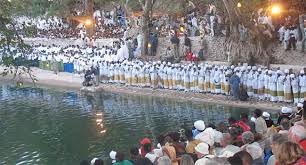
Every Year the Ethiopians Orthodox Church celebrates Timket (Epiphany) warmly all over the country. The celebration is to commemorate the actual baptism of the Lord Jesus Christ in the River Jordan. This commemoration is very important for the Ethiopian Orthodox Tewahido Church divinity. The Celebration takes place on Tir 10 in Ethiopian Calendar (on 19 January or on January 20 in Leap Year (in the Gregorian calendar). It’s a three days long celebration which is held by Christians all over the country.
Lalibela, Gondar and Addis Ababa being the most prominent cities, the most renowned place to celebrate Timket is a church in Gondar, Once King Fassiledes’s Castle transformed into a church. This sacred place is now the most symbolic of all churches in Ethiopia when it comes to the annual Timket ceremony. This is due to the fact that Gondar it is the only city to hold all the forty four Tabots or arks togather at this significant time.
Furthermore the church consists of a pond within its complex, which serves as a re eminence of the Jordan River.
On the eve of Timket, known as Ketera, priests and deacons wearing colourful robes and crowns participate in the festive processions. The priests pray throughout the long night and Kedase is concluded at around 2:00 a.m. People in masses camp out, singing church music, eating and drinking sitting around fires and torches. Christian followers attend an early afternoon mass service.
Followed by the actual Timket day the Tabots are carried by priests over their heads, where the Ceremony begins by the divine worship celebrated near the body of water early in the morning. After which the water is blessed and sprinkled on the followers. Many choose to submerse themselves into the holly water, thus emblematically renewing their baptism.
After the baptism the Tabots of each church return to their respective churches accompanied by a well dressed (Usually white cloths) and singing mass of people. in Ethiopia people wear their best cloths on Timket day. There is also an Amharic saying “ለጥምቀት ያልሆነ ቀሚስ ይበጣጠስ” which means a dress that is not used on Timket will be torn to shred.
